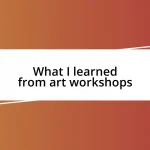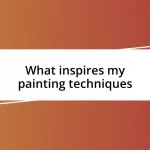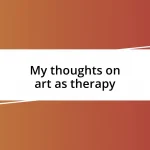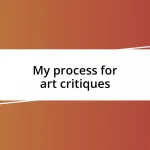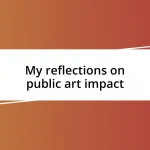Key takeaways:
- Embrace vulnerability and emotional honesty in performances to connect authentically with the audience.
- Choose acting classes based on instructor expertise, class size, and curriculum focus to enhance skill development.
- Participate in local productions and explore various acting styles to gain practical experience and foster creativity.

Understanding the Acting Basics
Acting is more than just memorizing lines; it’s about embodying a character and bringing their story to life. I still remember my first stage experience where I could barely breathe from nerves, yet the moment I stepped into character, everything changed. It’s like slipping into a second skin—that feeling of total immersion is what truly ignites the magic of performance.
Understanding the basics of acting often involves mastering techniques like voice modulation, physicality, and emotional resonance. When I began, I was clueless about how to project my voice without shouting or how to convey emotion through body language alone. It was a revelation to discover that subtle facial expressions could speak volumes; I realize now that sometimes, less is more.
Moreover, learning the fundamentals of acting also requires vulnerability. There’s a certain courage needed to fully express your emotions on stage. Have you ever found yourself in a moment where you had to dig deep emotionally? I remember a scene in a class where I had to channel grief. It felt raw and uncomfortable while performing, but that experience taught me that embracing vulnerability not only connects you with the audience but also helps you build a more authentic performance.

Choosing the Right Acting Classes
Choosing the right acting classes can feel like a daunting task, but it’s essential for honing your skills. From my experience, I found that researching instructors and understanding their teaching styles greatly impacted my growth. There’s a noticeable difference between a class that emphasizes technique and one that focuses on emotional connectivity. One of my most enlightening classes was with a teacher who encouraged improvisation, allowing me to explore my creative instincts without the pressure of a scripted performance.
Here are some key factors to consider when selecting acting classes:
- Instructor’s Reputation: Look for seasoned actors or directors who offer insights and experiences.
- Class Size: Smaller classes often allow for more personalized feedback, which can be crucial for growth.
- Curriculum Focus: Decide if you’re more interested in method acting, improvisation, or scene work; different classes cater to different styles.
- Student Level: Ensure the class matches your skill level; beginners may benefit more from foundational courses.
- Trial Sessions: Don’t hesitate to attend a trial class to gauge the environment and teaching style before committing.
I remember attending a trial class that felt incredibly supportive, encouraging genuine exploration and risk-taking. That sense of safety made all the difference; it was here that I realized the importance of being in a nurturing environment to truly grow.

Practicing Regularly with Techniques
When it comes to honing my acting skills, practicing regularly with a variety of techniques has been a game changer. I found that incorporating vocal exercises into my daily routine not only improved my projection but also helped me gain control over my breathing. The first time I stood in front of the mirror, reciting monologues while experimenting with pitch and tone, was an eye-opener. It felt awkward but exhilarating—like discovering a hidden facet of my voice I never knew existed.
Beyond vocal techniques, understanding the importance of physicality in acting has been key for me. When I first delved into movement exercises, I was struck by how my body could transform my character’s emotions. I distinctly remember a class where we explored different walks—changing my posture and stride revealed nuances in the character I’d never considered. It’s fascinating how something as simple as movement can deeply influence how an audience perceives a performance, isn’t it?
Another valuable practice I adopted was emotional recall, a technique that allows actors to tap into personal experiences for deeper character connection. I recall a moment during rehearsal when I was tasked with portraying a joyful scene; I closed my eyes and remembered a day filled with laughter at the beach with friends. Channeling that joy into my performance felt like magic. This technique isn’t just about reliving emotions; it’s about crafting layers in my character that resonate with authenticity and make the performance feel real.
| Technique | Description |
|---|---|
| Vocal Exercises | Enhances projection, control, and breath management through daily practice. |
| Physicality Exercises | Explore movement to embody characters, revealing emotional depth. |
| Emotional Recall | Taps into personal memories to evoke genuine emotions during performance. |

Seeking Feedback from Peers
Seeking feedback from peers has been one of the most transformative aspects of my acting journey. I recall a particular scene study session where I performed a challenging monologue. Afterward, my classmates shared their impressions, and I was surprised to hear perspectives I never considered. Their constructive criticism helped me see new layers in my performance and pushed me to go deeper.
Sometimes, it felt intimidating to open myself up to feedback, but I’ve learned that vulnerability is crucial in acting. I remember feeling raw after a scene, only for a peer to point out how my emotional honesty resonated with them. It was a moment that made me realize how powerful it is to connect with others through our performances. Seeking feedback isn’t just about improving skills; it’s about building relationships with those who share the same passion.
Engaging in informal feedback sessions post-rehearsal has also been enlightening for me. I often catch up with a close friend who is also an actor, where we exchange thoughts on each other’s performances over coffee. Those conversations are rich with insights, from vocal nuances to emotional honesty. It’s in those candid moments that I’ve found the most growth, reinforcing the idea that we elevate our craft together, creating a supportive network in the process. Don’t you think it’s incredible how much we can learn from each other?

Participating in Local Productions
Participating in local productions has been a significant stepping stone in my acting journey. I vividly remember my first community theater role as a quirky side character; it was both thrilling and nerve-wracking. Standing backstage, heart racing, I realized just how vital embracing those early experiences has become. Each production—no matter how small—opened doors to learn from seasoned actors and directors, offering insights that practical classes alone never could.
With each rehearsal, I found myself immersed in a collaborative atmosphere. One night, after a particularly rough run-through, I was taken aback by the supportive feedback from my fellow cast members. They shared their struggles and breakthrough moments, making me feel part of a tight-knit community passionate about helping one another. It reinforced my belief in the power of teamwork in theater; every actor’s unique style contributes to a richer performance. Doesn’t it feel empowering to know that you’re part of something bigger than just your own role?
Taking part in local productions isn’t just about acting; it’s a crash course in resilience and adaptability. I distinctly recall facing a last-minute script change during a live performance. My instinct was to panic, but I leaned into the unexpected and made the most of it, which ultimately led to an unexpected moment of laughter from the audience. It taught me not only about thinking on my feet but also about being open to spontaneity in my craft. Have you ever found that embracing the unexpected can lead to some of your most memorable moments?

Exploring Different Acting Styles
Exploring different acting styles has been a captivating part of my journey. I remember attending a workshop focused on method acting, where I was encouraged to fully embody my character’s emotions. The process was intense—breaking down my own barriers and experiencing raw vulnerability. Have you ever felt so consumed by a role that you lost track of who you were momentarily? It was enlightening!
Another style I delved into was classical acting, which introduced me to the rich nuances of Shakespearean text. The rhythm and cadence of the language felt like a dance, forcing me to pay close attention to every word. I was nervous the first time I performed a sonnet in front of an audience, but that nervousness transformed into exhilaration as I connected with the text. Isn’t it fascinating how specific styles can evoke different emotional responses?
Lastly, I ventured into improvisational acting, which opened up a new realm of creativity for me. One night, during an impromptu performance, my scene partner and I completely deviated from the planned storyline, leading to uncontrollable laughter from the audience. It taught me the beauty of spontaneity and how our most unexpected moments can lead to genuine connections on stage. Have you ever tried improvisation? The thrill of creating something on the spot feels like magic!

Continuing Education and Skill Development
Continuing education has been a vital part of my acting journey. I recall enrolling in acting classes that focused not only on technique but also on emotional intelligence. One session particularly stands out—a teacher prompted us to delve deep into our own experiences to connect with our characters. This approach resonated with me, reminding me of the power of personal storytelling. Have you considered how your own life can enrich your performances?
Further along my path, I sought out mentorship opportunities with experienced actors. I remember sitting down for coffee with a seasoned performer who shared invaluable tips about overcoming stage fright. Their encouragement helped me embrace my nervous energy and transform it into a source of power. It made me realize that continuous learning isn’t just about formal education; it’s about seeking wisdom from those who have walked the path before us. Don’t you find that sometimes the best lessons come from real-life experiences?
I’ve also actively participated in online workshops, which broadened my horizons. During one particular session, I learned about voice modulation, discovering how a slight change in tone could dramatically affect a scene’s emotional impact. I practiced tirelessly, experimenting with different pitches and rhythms until I found a unique voice that felt authentic to me. Isn’t it amazing how our skills can evolve through exploration and willingness to step outside our comfort zones?



